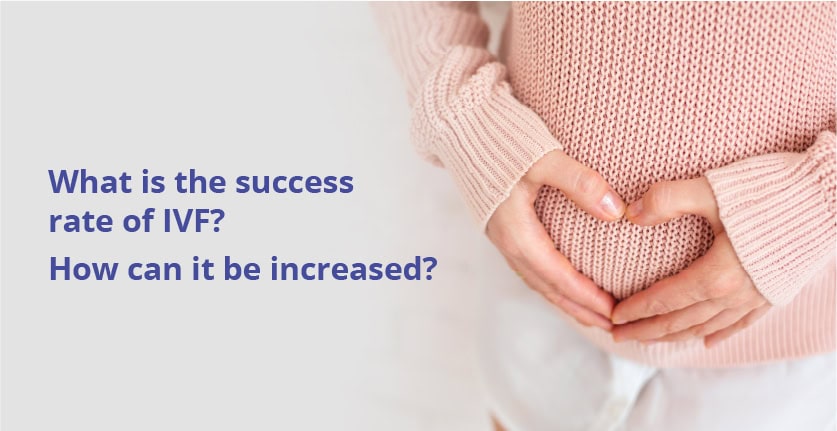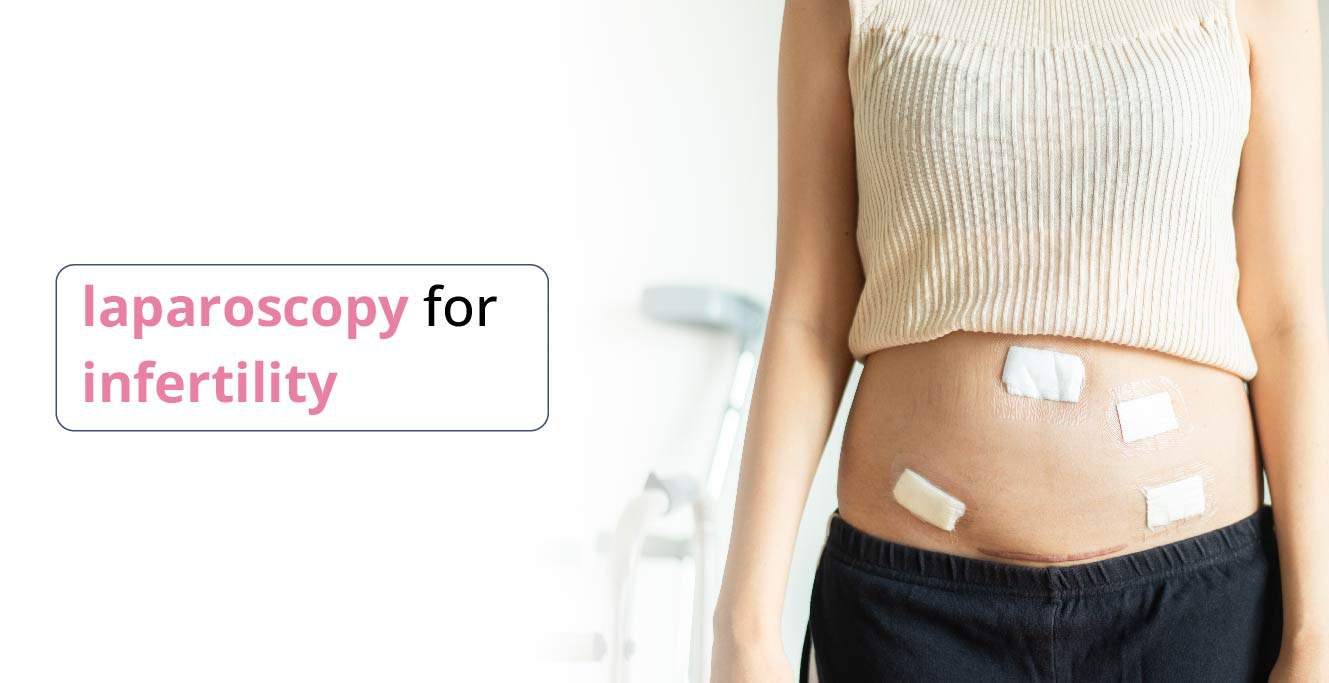What is the success rate of IVF?
- Published on December 28, 2021

Table of Contents
What is IVF?
In vitro fertilization or IVF as it is called, is one of the types of Assisted Reproductive Techniques, which uses a combination of medicines and surgical procedures that help sperm fertilize an egg and implant the fertilized egg in the uterus.
IVF Success Rate in India
IVF success rates in India have increased over time, which is a result of improvements in medical technology and a rise in the level of knowledge among reproductive specialists. The overall success rate for IVF in India normally ranges from 30% to 50% per cycle. Success rates might vary depending on several circumstances, including the age of the woman, the quality of the embryos, and underlying medical issues.
Improved laboratory procedures, a greater comprehension of the needs of individual patients, and a rise in the use of pre-implantation genetic testing to identify viable embryos are all factors that have contributed to the success rates increasing. Furthermore, patients from all over the world looking for affordable solutions have been drawn to India because of the low cost of IVF treatments there.
It’s significant to remember that success rates can vary from clinic to clinic. Prospective patients should do their homework and speak with knowledgeable fertility doctors to learn their specific odds of success given their particular circumstances.
What are the factors that affect the IVF success rate? How can it be increased?
If you go by the numbers, the success rate for an IVF pregnancy is about 30% with live birth rates being a little lower than 30%. There are multiple factors that could affect the success rates of IVF and there are multiple ways to improve the chances of you conceiving using simple lifestyle changes. As you are someone who is looking forward to an IVF cycle, you should be aware of the same. There are also ways to mitigate the risks that are associated with the mentioned factors and we shall also increase our awareness of the same.
Age
Your age is one of the most important IVF success factors to consider. While younger women have higher chances of IVF success, the reduction in the number of eggs and the reduction in the quality of the eggs as you age tend to be the reasons behind the reduction in the success chances of IVF treatment in older women. In fact, the live birth IVF success rate for women who are under 35 and who start an IVF cycle is 40 per cent. However, the success rate for women over age 42 is 4 per cent.
Previous pregnancy and partner:
One more important factor to consider during IVF is whether or not you were pregnant previously and if it was with the same partner. The probability of success is much higher if you were previously pregnant with the same partner that is undergoing the IVF treatment. Factors such as having a history of recurrent miscarriages or previous pregnancy with a different partner may reduce the chances of IVF success.
Type of fertility problems:
While some male infertility problems do impact IVF success, factors like uterine abnormalities, exposure to DES, or fibroid tumours that you might be facing, also decrease the likelihood of your success with IVF. Very important to know: IVF success factors are dependent on ovulation. Ovarian dysfunction, like high FSH levels which indicate a low ovarian reserve, may also reduce the chances of your IVF success. There could be a need for you to take large amounts of ovulation stimulation drugs. When both partners are infertile with lower chances for IVF success, factors such as the length of time you have been infertile are important to consider. The chances of IVF success decrease with the amount of time a couple has been infertile.
Use of donor eggs:
Donor eggs are a significant consideration, especially if you are over 35-40, as there may be a higher rate of IVF success. Factors such as egg quality and age of the donor are important. Using donor eggs from younger women may increase the chances of pregnancy for women over 40. 2011 findings show a 55 per cent live birth success rate with a fresh donor egg/embryo transfer.
Lifestyle habits:
Stop smoking if you want to improve your chance of having a baby. In fact, many times the woman is required to stop smoking at least 3 months before starting IVF treatment.
- Smokers require higher dosages of fertility drugs to stimulate their ovaries
- Smokers have lower implantation rates than nonsmokers
- Women who smoke require almost twice as many IVF attempts
- Women who smoke experience more failed fertilization cycles
- More IVF success factors to mull over include losing weight if you are overweight or obese.
- Women who are overweight have an increased risk of infertility as well as miscarriage. Overweight women also have less IVF success with fertility treatments than women of normal weight. Underweight women are also at greater risk of having success with IVF.
Bottom line: aim to stay within a healthy weight range.
Fertility clinic:
The centre you choose to perform the IVF treatment can greatly affect your IVF success. Factors to think about when reviewing the success rate of fertility centres include:
- The training and experience of the IVF clinic and staff
- The live birth rate per IVF cycle started
- The rate of patients pregnant with multiples (twins, triplets or more)
- The laboratory used by the clinic and the qualifications of their staff
- The types of patients accepted at the clinic, more specifically their age and fertility problem
- Keep in mind that some clinics are more willing to accept patients with a lower chance of IVF success or they may specialize in particular treatments.
Also, read ivf process in hindi
IVF Success Rates By Age
Fertility typically declines with age and along with it IVF success rate also reduces. It happens because the quality and quantity of eggs decrease with age which directly affects fertility and causes difficulty in conception. The success rate may also vary depending on the age –
-
IVF success rates under 35
It is said that men and women are more fertile in their 20s and have a higher success rate of pregnancy compared to people in their 30s. The success rate may vary from one fertility clinic to another depending on the specialisation of the doctor and the type of cycle opted for assisted reproduction. The average success rate is generally between 25% to 35% for women under 35.
-
IVF Success rates over 40
The success rate of assisted reproduction and natural conception typically minimize for women over 40. According to research, it is believed that the average success rate of IVF for women in their 40s is usually 3% to 4% per cycle. The chances of conception get really low and women may experience trouble getting pregnant through IVF or even naturally.
IVF Success Rate By Number OF Embryos
The number of embryos transplanted during in vitro fertilisation (IVF) can affect the success rate of the process. The ideal number of embryos to transfer can, however, change depending on the woman’s age, the quality of the embryos, and any underlying medical issues. Fertility doctors are frequently consulted when deciding how many embryos to transfer in order to increase the likelihood of a healthy pregnancy while lowering the danger of multiple pregnancies, which can pose health risks.
In some situations, particularly for older women or those who have a history of poor IVF treatments, transferring a greater number of embryos can boost the likelihood of a successful pregnancy. It also increases the likelihood of multiple pregnancies, which can have negative health effects on both the mother and the unborn children. Many clinics try to balance getting pregnant with preventing multiple births.
It’s crucial to understand that while adding more embryos may raise the likelihood of success, the hazards should also be considered. The right number of embryos transfer is decided by fertility professionals in close consultation with patients based on their unique situations and medical needs.
Summary:
Hence, if you suspect you might have issues with fertility it is always advisable to not delay making a visit to a trusted doctor and address the same. The sooner you try and address the issue, the less severe the problem could be. You’re just a doctor visit away from creating a happy family that you have always dreamt of.
Frequently Asked Questions (FAQs):
- What is the success rate of IVF on the first try?
At Birla Fertility & IVF, the success rate of IVF on the first attempt is approximately 85%. However, this is a standard success rate that may vary based on various factors like the type of infertility, the type of technique used for the IVF treatment, and the age of the patient.
- Does IVF have a 100% success rate?
No. It is a myth that IVF has a 100% success rate in the first cycle. However, at Birla Fertility & IVF we have a 99% success rate on a multi-cycle IVF package.
- At what age is IVF successful?
Experts say that IVF can be successful depending on various reasons such as the type of infertility disorder, the age of the patient, and the type of IVF technique you are undergoing in order to achieve conception. Furthermore, it is also stated by experts that the younger the age of the patient the higher the chances are for successful conception.
Related Posts
Written by:
Our Services
Fertility Treatments
Problems with fertility are both emotionally and medically challenging. At Birla Fertility & IVF, we focus on providing you with supportive, personalized care at every step of your journey towards becoming a parent.Male Infertility
Male factor infertility accounts for almost 40%-50% of all infertility cases. Decreased sperm function can be the result of genetic, lifestyle, medical or environmental factors. Fortunately, most causes of male factor infertility can be easily diagnosed and treated.We offer a comprehensive range of sperm retrieval procedures and treatments for couples with male factor infertility or sexual dysfunction.
Donor Services
We offer a comprehensive and supportive donor program to our patients who require donor sperm or donor eggs in their fertility treatments. We are partnered with reliable, government authorised banks to source quality assured donor samples which are carefully matched to you based on blood type and physical characteristics.Fertility Preservation
Whether you have made an active decision to delay parenthood or are about to undergo medical treatments that may affect your reproductive health, we can help you explore options to preserve your fertility for the future.Gynaecological Procedures
Some conditions that impact fertility in women such as blocked fallopian tubes, endometriosis, fibroids, and T-shaped uterus may be treatable with surgery. We offer a range of advanced laparoscopic and hysteroscopic procedures to diagnose and treat these issues.Genetics & Diagnostics
Complete range of basic and advanced fertility investigations to diagnose causes of male and female infertility, making way for personalized treatment plans.Fertility Calculators
Empower your journey to parenthood with our fertility calculators. Accurate, personalized guidance for your fertility goals.
Our Blogs
To Know More
Speak to our experts and take your first steps towards parenthood. To book an appointment or to make an enquiry, please leave your details and we will get back to you.






































